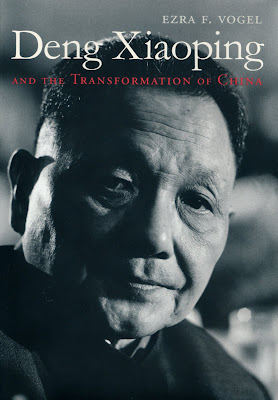Reader's Advisory Matrix: Deng Xiaoping and the Transformation of China by Ezra F. Vogel
1. Where is the book on the narrative continuum?
Highly fact-based.
2. What is the subject of the book?
Deng Xiaoping, the second leader of the Chinese Communist Party, from his personal life to his policies and impacts.
3. What type of book is it?
A biography and history of overall Chinese politics and policies.
4. Articulate appeal
-What is the pacing of the book?
It is a leisurely pace.
-Describe the characters of the book.
It is heavily focused on Deng Xiaoping, the man who took over leadership of the Chinese Communist Party after the death of Mao Zedong. The book also mentions other politicians (Chinese and international) during Deng's leadership, figures in Deng's personal life, and other citizens of the Republic of China.
-How does the story feel?
Scholarly, highly detailed, politically impartial.
-What is the intent of the author?
To educate the reader on Deng Xiaoping.
-What is the focus of the story?
The life and career of Deng Xiaoping, as well as the effect his career had on China and the world.
-Does the language matter?
Yes, it is heavily biased toward scholarly language.
-Is the setting important and well-described?
Yes, the settings are incredibly important, but not well-described as spaces, rather as pieces of the story.
-Are there details and, if so, of what?
There is incredible detail. Vogel leaves nothing of Deng Xiaoping's life out, as well as taking the time to describe world politics, state-of-the-world descriptions throughout the decades he covers, and the effects of his policies on the everyman.
-Are there sufficient charts and other graphic materials? Are they useful and clear?
In the middle of the book, there is a collection of photographs of Deng Xiaoping, either portraits or him at work. They are useful in showing Deng Xiaoping in action, as well as depicting him in all the decades Vogel covers.
-Does the book stress moments of learning, understanding, or experience?
Learning and understanding. The reader learns very much about Deng Xiaoping, Chinese history and politics, and world politics. There is also the intention of understanding; Vogel writes with as much detail as possible and zero hints of his personal opinions, which leaves the reader the responsibility of coming to their own conclusions about the man within the pages and his impact.
5. Why would a reader enjoy this book (rank appeal)?
1. Learning/understanding
2. Detail
3. Scholarly language


Hi Annaliese, I feel that I fully know what to expect from this book based on your annotation. While I prefer non fiction higher on the narrative spectrum, if I had to read this, I would greatly appreciate the photographs to help me picture the subject. I would also appreciate the author's neutrality. Great summary!
ReplyDeleteI totally get that! I love a greater narrative, but something about Vogel's writing really drew me in. I especially admired his impartiality, allowing the reader to analyze the simple facts and make their own conclusions.
DeleteThe dedication of so many historians to be accurate, impartial, and thorough is mind-boggling to me. We owe them so much.
ReplyDeleteI agree, I love Vogel's straight-to-the-point way of telling Deng Xiaoping's story. It can be difficult for anyone to hide their ideals and values when writing about political policies. I especially admired the way he handled writing the Tiananmen Square Massacre, Deng's most controversial moment in office.
DeleteHow do you feel about the use of scholarly language in relaying the information of Deng Xiaoping? Obviously context and impartiality are important to tell the true events of the historical narrative, and the novel is written for scholarly minded people to read. But I wonder if there is an opportunity or benefit in telling the same historical narrative with less scholarly language, with some more dramatic verbiage, to have more people exposed to and learn about this portion of history
ReplyDeleteI agree, there's a context needed for the use of scholarly language. If Vogel wanted a general population to read it, he may have wanted to go with more narrative language like Erik Larson. The use of scholarly language practically mandates its use in a scholarly setting, such as a history class or a professor's papers.
DeleteThis doesn't look like a light leisurely read but it does sounds fascinating. Great write up!
ReplyDelete